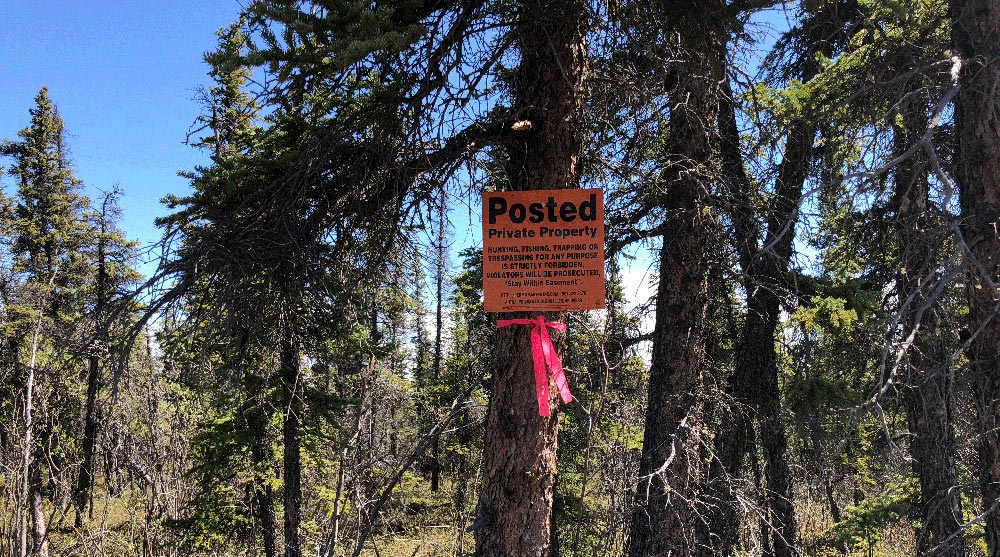
Throughout the year numerous private property owners solicit Ahtna to purchase their property. Currently all requests from private landowners to sell their undeveloped land, primarily native allotments, go through the Land Department. Requests that meet identified criteria are reviewed by Senior Management before going to the Land Committee for consideration. If the Land Committee makes a recommendation to purchase the property the AI Board of Directors reviews and makes a final decision.
Ahtna has a procedure in place to determine if a property for sale qualifies for consideration. The property must meet at least one of the criteria below before being brought before the Land Committee and generally the more criteria the better the opportunity for the property to be purchased.
Location – Properties that are substantially surrounded by Ahtna owned lands, or are strategically located in an area that would provide Ahtna significant business or economic opportunity or advantage, will be considered to have high value or access control.
Land Market – Property that is priced significantly lower than its appraised value or the prevailing real estate market, or that could by some other means provide Ahtna significant returns on its investment, will be considered to have high investment value.
Resources – Properties containing abundant resources (i.e. sand and gravel, timber, minerals, etc.) that could provide Ahtna with potential for significant profits from resource development, either as a stand-alone operation or in conjunction with an operation on adjacent Ahtna owned lands, will be considered to have a high resource value.
Historical/Cultural – Properties containing important archaeological resources (i.e. graves or cemeteries, artifacts, archaeological features, etc.) or containing areas that the people believe have significant spiritual or emotional values that are critical to the preservation of the history and culture of the Ahtna People will be considered to have high historical/cultural value.
Controlling Interest – Properties that are located so to provide Ahtna a dominant or controlling position in land ownership or economic interests will be considered to have a high value.
Throughout the year native allottees will contact the Land Department to offer their allotment for sale. Since all the requests to purchase native allotments meet at least one of the land purchase criteria, staff prepares information to be submitted to the Senior Management Team. Often the native allotment owner doesn’t fully understand the Bureau of Indian Affairs (BIA) Policies regarding Trust Land.
Below is an overview of how native allotment sales are administered by the BIA:
Negotiated Sale. This type of sale is between the allotment owner and a private party. The private party is responsible for making a written offer for the property to the BIA – including a per acre price, obtaining and paying for a property appraisal and survey (if a survey is required) from a pre-approved BIA survey and appraisal company. It can easily take up to one year before the private party knows the land value. Generally, the offer letter states a not-to-exceed price of the appraised value.
*The allotment owner can request BIA to perform an appraisal to help Ahtna better determine the starting price for the property.
Advertised Sale. This type of sale begins with the allotment owner contacting BIA to request the sale of the property. The BIA then proceeds with doing an internal land appraisal and if needed, request to subdivide the property or establish an easement within the allotment and a property survey (if required). After the appraisal and survey are completed the BIA advertises the property in local newspapers for interested parties to submit an offer with an identified minimum bid.
Ahtna Land Purchase Procedures:
1. Requests for sale of undeveloped land will be submitted by seller to the Ahtna Land Department.
2. Land Department will evaluate proposal from seller and determine if it meets the existing criteria for purchase.
3. If the property meets the criteria, Land Department will prepare a property packet and distribute to Senior Management for review.
4. Sr. Management will review and propose a go/no-go testing dependent on market price, development opportunities, strategic corporate goals, etc.
5. If the opportunity meets the requirements of the go/no-go testing, the proposal would then be evaluated by the Ahtna Land Committee before being submitted to the Ahtna Board.
6. If the opportunity does not pass the go/no-go testing, a written report will be submitted to the Land Committee with an explanation of failure.
7. Developed or commercial property purchase procedures will be similar except initial evaluation will go through an Ahtna subsidiary company and specific Ahtna Department, e.g. Finance Department versus the Land Department.
